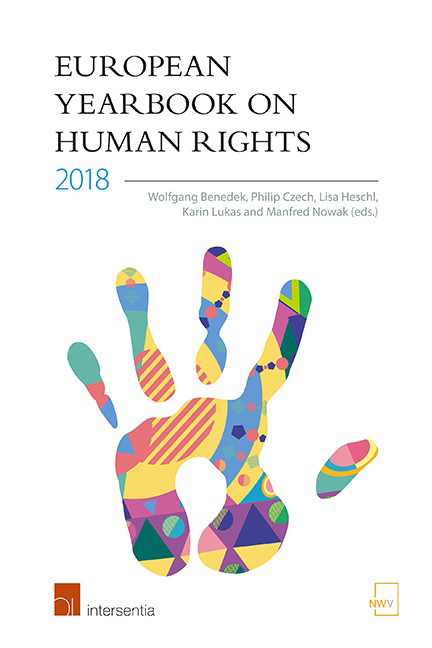Book contents
- Frontmatter
- Scientific Advisory Board
- Editors’ Preface
- Contents
- List of Abbreviations
- List of Contributors
- Part I Topic Of The Year
- Part II Eu
- Part III Coe
- The Jurisprudence of the European Court of Human Rights in 2017
- A Decade of Violations of the European Convention on Human Rights: Exploring Patterns of Repetitive Violations
- The Boundaries to Dialogue with the European Court of Human Rights
- Unprincipled Disobedience to International Decisions: A Primer from the Russian Constitutional Court
- The Impact of ECtHR and CJEU Judgments on the Rights of Asylum Seekers in the European Union: Adversaries or Allies in Asylum?
- The Human Right to Leave Any Country: A Right to be Delivered
- Some Reflections on the Principle of the Best Interests of the Child in European Expulsion Case Law
- Salafism in Europe: A Legal and Political Analysis of Human Rights and Security
- Delays in the Implementation of ECtHR Judgments: The Example of Cases Concerning Electoral Issues
- PART IV OSCE
- Part V Others
- Part VI Book Reviews
- Index
Delays in the Implementation of ECtHR Judgments: The Example of Cases Concerning Electoral Issues
from Part III - Coe
Published online by Cambridge University Press: 31 January 2019
- Frontmatter
- Scientific Advisory Board
- Editors’ Preface
- Contents
- List of Abbreviations
- List of Contributors
- Part I Topic Of The Year
- Part II Eu
- Part III Coe
- The Jurisprudence of the European Court of Human Rights in 2017
- A Decade of Violations of the European Convention on Human Rights: Exploring Patterns of Repetitive Violations
- The Boundaries to Dialogue with the European Court of Human Rights
- Unprincipled Disobedience to International Decisions: A Primer from the Russian Constitutional Court
- The Impact of ECtHR and CJEU Judgments on the Rights of Asylum Seekers in the European Union: Adversaries or Allies in Asylum?
- The Human Right to Leave Any Country: A Right to be Delivered
- Some Reflections on the Principle of the Best Interests of the Child in European Expulsion Case Law
- Salafism in Europe: A Legal and Political Analysis of Human Rights and Security
- Delays in the Implementation of ECtHR Judgments: The Example of Cases Concerning Electoral Issues
- PART IV OSCE
- Part V Others
- Part VI Book Reviews
- Index
Summary
ABSTRACT
According to Article 46 paragraph 2 of the European Convention on Human Rights (ECHR), the Committee of Ministers is in charge of supervising the execution of judgments of the European Court of Human Rights (ECtHR). Th ere are currently nearly 7,500 judgments pending before the Committee of Ministers and the implementation of some of them meet serious obstacles from the respondent States. As noted by the Committee of Ministers and the Parliamentary Assembly of the Council of Europe in their reports on this matter, the implementation of certain ECtHR judgments may reveal some ‘ pockets of resistance ‘. This article focuses on the ECtHR judgments concerning electoral issues: Hirst v the United Kingdom (no. 2) ; Paksas v Lithuania and Sejdic ; and Finciv Bosnia and Herzegovina, which have not been executed for several years. It is argued that, since these judgments touch upon serious political issues, their implementation is complex, both legally and politically. When these judgments were delivered, the fact that some ECtHR judges had expressed their dissenting opinions was an early sign of the problems which were later encountered in their execution.
INTRODUCTION
Under the system of the European Convention on Human Rights (the Convention), two bodies–the European Court of Human Rights (ECtHR) and the Committee of Ministers (CM)–are responsible for the good operation of its human rights protection system. The ECtHR may receive individual or inter-State applications (see Articles 34 and 33 of the Convention). If it finds a violation of the Convention, its judgment is transmitted to the Committee of Ministers, the Council of Europe‘s statutory body, which supervises the implementation of its judgments under Article 46 paragraph 2 of the Convention. In fulfilling this role, the CM is assisted by its Secretariat and especially the Department for the Execution of Judgments of the ECtHR (in the Council of Europe‘s Directorate General Human Rights and Rule of Law–DGI). As of 31 December 2017, some 7,500 judgments of the ECtHR were pending before the CM. Some of these judgments have been partially or almost fully implemented, while the execution of others is lagging behind; as long as the CM has not decided to close their supervision by adopting a final resolution, they are still pending before the CM, although they might be at various stages of execution.
- Type
- Chapter
- Information
- European Yearbook on Human Rights 2018 , pp. 445 - 464Publisher: IntersentiaPrint publication year: 2018



